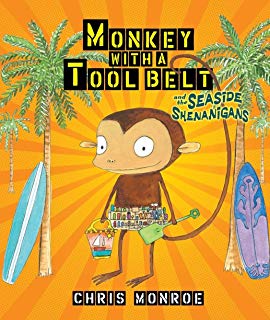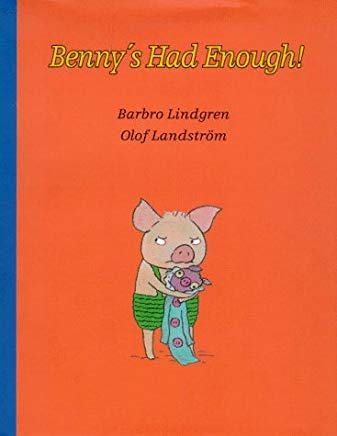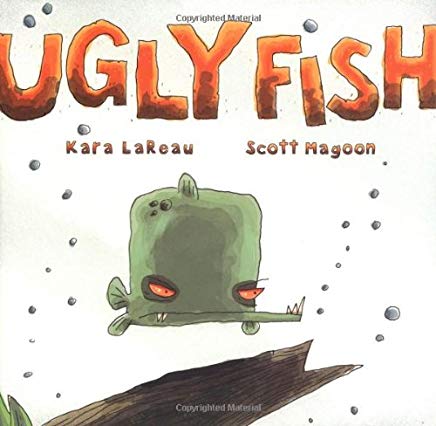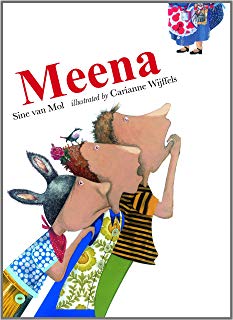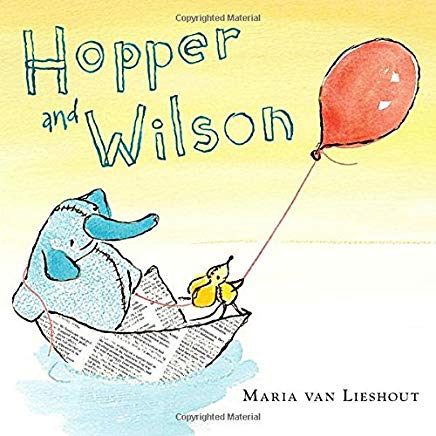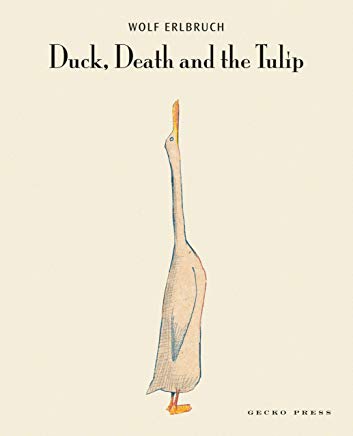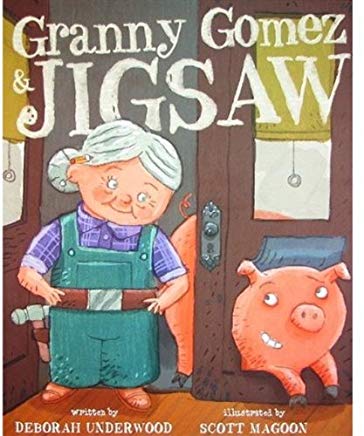The Blog
Blog Entry
Season’s Greetings
Why in the world would I write about Granny Gomez & Jigsaw when there was so much else going on the other day at the Strand where I discovered it? Some of this was good, some just strange, much worthy of wider attention: Chris Monroe was back with another in her Monkey with A Tool Belt series (this time: Seaside Shenanigans), and though I have written here before how I wished she’d stop while she was ahead, this could probably go on forever and still feel fresh and witty and brimming with affection – here Chico Bon Bon visits his friend Clark (the eponymous Noisy Problem in book two) and discovers a clumsy duck at the heart of one paradise’s energy dependency. There’s surfing. A well-earned sunset in the end. It’s great. Orange too. I hope there’s a rainbow of these before Monroe is finished.
There was Jon Klassen’s I Want My Hat Back which made me laugh and read it back again and laugh again and want to show it around to grumpy-looking store employees who were the only other people there at 10 AM on a Wednesday. Reader, I didn’t. Nobody likes to see a grown man cackling to himself alone in the children’s section. People ask me sometimes and I say I just like children’s books. Once I told someone I ran an online store, and she looked like she would eat me. There’s some of that in Klassen’s book (sorry, parents, to spoil your surprise) but what keeps you finally guessing is that none of these characters – not the bear or the fox or the deer or the frog or the unfortunate rabbit – have any mouths. They’re laconic, inscrutable until, well, they’re not. I could see this book being a big hit at kindergarten read alouds. I could see a couple of calls from home. And I could see a bunch of kids smacking themselves in the head and all together declaring, “Wait! I have seen my hat!”
Still, as long as we’re mildly freaking parents out, now might also be a good time to mention Duck, Death and the Tulip so we can really freak them out. This book is from the German author and illustrator Wolf Erlbruch, very little mediation appears to have occurred between our shores, and the result is truly odd, a little awkward sometimes, but genuinely haunting: you will read this book and feel like nobody has ever passed this way before. Here is Death in a robe with a gaping, grinning skull, here is Duck inquiring, Um, what are you doing here? And pondering whether the world would continue without him, and many other head-scratching things. Here is Death taking a nap, climbing a tree, here is that Tulip that either didn’t make it over in translation or remains deliberately unmentioned – like a lot of stuff between these covers. Here, in short, is a book you are unlikely to ever hear about again once it is banished to some poorly lit warehouse like the Ark of the Covenant in Indiana Jones. That’s too bad. Death turns out to be a pretty nice guy, apart from his gaping, grinning skull.
Not many shelves away was Hopper and Wilson by the Dutch-born author and illustrator Maria Van Lieshout, which begins with two stuffed toys – a bunny and an elephant – sitting at the end of a dock with their pet cactus and contemplating the possibilities that might await them if they ever got up the nerve to travel to “the end of the world.” Would there be a staircase to the moon? Infinite lemonade? I suppose there were Inspiring Messages here somewhere floating around the edges of this story, but Van Lieshout’s nautical landscapes were so inviting and forbidding both, that readers might just be able to sit back and enjoy this for the right-size adventure it is.
Note to self: if you are planning to go foraging for books from the end of the world, or anyway Europe, save some time and head for the ‘V’ and ‘W’ shelves first. The writer Sine Van Mol (also from Holland) and illustrator Carianne Wijffels (from Belgium) tell a story called Meena about that scary old lady that everyone knows, whether they live across the hall, or the block, or the polder. You try to stay out of her way, though once in while you may tempt her witchiness on a dare. Hopefully you won’t graffiti her sidewalk, as the increasingly overwrought children do here, but you might just leave a letter where she can find it. You tell stories about her eating toads, you see twitching, tiny limbs sticking out of her pockets, blood spilling onto the street, okay, maybe not. She says she’s somebody’s grandmother. She says that’s cherry syrup for the pie. Here, taste some.
Why then, with such knobby old battle-axes left over from Halloween – why waste a minute of our time on rosy-cheeked Granny Gomez? You’ve read this story before, right? About the quirky, spunky widow who has everything – but nothing to love. I probably would have skipped right by it on the wall myself if I did not recognize the name Scott Magoon from his contribution to the willfully shocking Ugly Fish of several years ago, and if the pig didn’t remind me of Olof Landstrom’s brooding little hellion in Benny’s Had Enough!
So I was hoping for something Scandinavian like that at least – what gets suppressed tends to eventually spurt out in surprising ways – but instead this is simply a cheerful little yarn narrated with the same plucky enthusiasm that Granny Gomez herself brings to every one of her hobbies and avocations: drumming and mountain climbing and, yes, jigsaw puzzles. Don’t ask why it has to be a pig she adopts – it just does – though by the time Jigsaw outgrows even her big country house, there’s no reason to think she won’t be able to single-handedly construct an alternative living arrangement with supplies from the hardware store and a manual called Barn Building for Beginners. This book is like that a little – even for all of Magoon’s and Deborah Underwood’s experience, there’s an amateur’s delight in the details: those drums which probably do not need to be mentioned in any industry pitches, or the bit about Jigsaw compulsively chewing Granny’s skis in two as he gets older, or the fact of their watching cooking shows together. These things do not get a books sold, I suspect, or more prominently shelved or reviewed, and yet they are why we keep reading; you know it when they’re gone.


